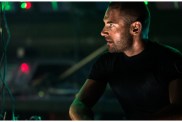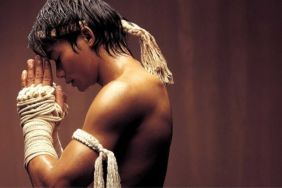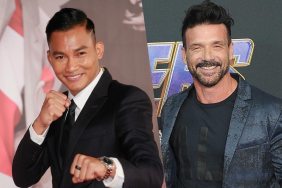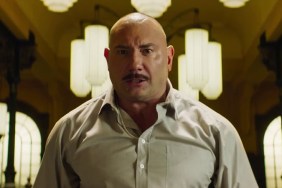Tony Jaa as Ting
Petchthai Wongkamlao as George
Pumwaree Yodkamol as Muay Lek
Rungrawee Borroijindakul as Ngek
Chetwut Wacharakun as Peng
Wannakit Siriput as Don
Sukhaaw Phongwilal as Khom Tuan
Chatthapong Pantanaunkul as Sming
Pornpoimol Chookanthong as Mae Wann
Chumporn Teppitak as Uncle Mao
David Ismalone as Mad Dog
Hans Eric as Pearl Harbour
Paul Gaius as Lee
Nick Kara as Big Bear
Summary:
Despite its low-budget look and feel, Ong-Bak is an entertaining film that marks the debut of a stunning new action star in Tony Jaa. Well on its way to being considered a martial arts classic.
Story:
When the head of their sacred statue of Ong-Bak is stolen from the Thai village of Nong Pradu, they send their greatest martial artists fighter, Ting, to Bangkok to get it back. There, Ting gets roped into a world of drug dealers, organized crime and extreme fighting for money.
Analysis:
The rich history of martial arts cinema goes back for decades, but for the most part, it has been China’s domain, as the country remains the chief exporter of legendary martial artists like Bruce Lee, Jackie Chan and Jet Li. During that time, Thailand had been establishing its own martial arts legacy with Phanna Rithikrai making little known movies like Born to Fight. Decades later, Rithikrai’s protégée Tony Jaa and director Prachya Pinkaew revive the tradition with an action movie that owes much to the Chinese formula genre, but adding things that clearly differentiate it as a Thai film.
This is immediately obvious from the distinctive opening sequence in which dozens of mud-covered men take part in a impressive game of “Capture the flag” held in the branches of a tall tree, fighting their way to the prize. The winner is a young man named Ting, who is trained in the ways of the village’s unique martial arts style. When a drug dealer steals the head of the village’s idol Ong-Bak, Ting is sent to Bangkok to retrieve it. From there, the film turns into a more violent version of The Gods Must Be Crazy, as Ting tries to adjust to big city life, becoming involved with a bunch of unscrupulous characters including a mob boss who doesn’t appreciate losing money when he bets against Ting in bar fights.
This simple premise is the basis for what some may consider a rather stereotypical martial arts film, but there is a certain charm to the low budget storytelling in which many of the characters are aware that they are little more than over-the-top clichés. Ong-Bak‘s B-movie sensibilities are easily forgivable since it never takes itself too seriously. Even the most amateurish acting and dialogue makes the movie funnier, because it knows that fans of the genre like being a part of the joke. This is most apparent with the film’s main baddie Khom Tuan, who speaks through a voice box. We never find out what happened to his vocal chords, nor does it matter, since this characteristic allows for one of the film’s funniest sight gags where he smokes a cigarette through a hole in his larynx.
What Ong-Bak lacks in subtlety, it more than makes up for with some of the best action sequences I’ve seen in a long time. The single best reason to see this movie is to marvel at the amazing Tony Jaa, whose stunts and fight scenes are unbelievable, as he uses no wirework or CGI to embellish them. Many of Jaa’s more impressive moves are shown over and over from different angles to prove to naysayers that no camera trickery is involved, and Jaa mixes things up with both non-combative stunts and some hard-edged full contact martial arts.
Most of it is not for the faint of heart since it’s the type of violent martial arts more typical of Bruce Lee than Jackie Chan, something apparent from Jaa’s signature finishing move, the elbow to the head. Jaa’s fighting ability takes center stage during an elaborate scene in a bar where he takes on comical villains like the burly Big Bear, fights a super speedy guy dressed like a 70’s disco dancer, and then a fighter named Mad Dog, who has a penchant for breaking furniture, usually over our hero’s head, pretty much destroying the bar in the process. Ting’s biggest challenge is a Burmese boxer so pumped up on steroids that he can’t feel any pain; they have two memorable hand-to-hand battles that showcase both their skills.
Although the martial arts are the film’s strong suit, there are also a number of cool chases through the streets of Bangkok. In the first one, Jaa is chased by an angry mob, as he makes amazing leaps over cars, tables and anything else in his way. Later, there’s an even stranger chase involving golf cart size taxicabs that lead to some impressive stunts and pyrotechnics. Although Pinkaew was clearly influenced by early Jackie Chan films, there’s just as much Western influence from more recent Hollywood martial arts films like Romeo Must Die. It’s most evident from the use of a cool soundtrack that mixes traditional Eastern music with modern electronica.
Jaa doesn’t talk very much, preferring to play the strong, silent type and leaving the dialogue and humor to his able supporting cast. Petchtai Wongkamlao offers most of the film’s comic relief as the hapless George, a loser who just isn’t very good at being a criminal. He makes a great intermediary for Ting getting acclimated to the big city, and he even gets in on the action a bit, even if he doesn’t have Jaa’s skills and tends to stick to more humorous fighting. George’s young sidekick, Muay Lek, is a teenage girl who probably has one of the most irritating voices ever-it’s like nails on a chalkboard-although that exaggerated whine does make her scenes even funnier, while Ting’s old grandmother gives such a hilarious overly dramatic performance that you can’t help but laugh.
The Bottom Line:
Those who enjoy Jackie Chan’s earlier work like Rumble in the Bronx will love the mix of action and humor in this entertaining debut from Prachya Pinkaew and his star Tony Jaa, although one should prepare for a darker and more violent ride.










